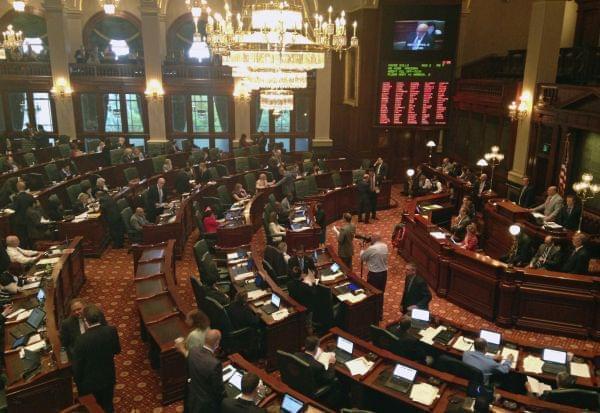What Does A Budget Shutdown Look Like?

Members of the Illinois assembly meet in the House chambers, at the state Capitol. Pieces of Illinois Democrats' proposed state budget are coming into focus as lawmakers begin advancing them in the Legislature ahead of a scheduled Sunday adjournment. (AP Photo/Sara Burnett)
The spring legislative session ended without a budget deal between Democratic legislative leaders and Republican Governor Bruce Rauner.
The legislature plans to continue session into the summer. But what happened if a spending plan is not in place when the state’s fiscal year begins on July 1?
Democrats did pass several spending bills before the end of the regular session, but the state doesn’t have the money to fully back them up. Rauner says he won’t consider new revenue until the General Assembly approves at least some of his business-friendly agenda.
Rauner and Democratic leaders say they will continue to work together. But right now, at least in public, they don’t have many positive things to say about the situation or each other.
The lack of a deal means lawmakers may have to give up their vacation plans to work in Springfield for at least some of the summer. But if there is no budget at the start of the new fiscal year, what would that mean for average Illinoisans? In the first few days, probably not much.
But if an impasse drags on, state government will begin shutting down at a slow trickle. Retired U of I political science professor Kent Redfield explains: “If you don’t have an authorization too spend money, you can’t write checks. So at some point, the comptroller stops writing checks for people’s salaries for grants. It doesn’t happen all at once. But if you don’t have a budget, then you’re going to slowly shut down state government.”
Redfield says that some public safety employees, like state police officers and corrections officers, would stay on the job. Retired workers would still get their pension checks. But social service providers and other groups that count on state funding would see it dry up. And if the summer is spent in political gridlock, that could include schools.
Roger Eddy, with the Illinois Association of School Boards, says districts will be affected differently depending on how much they rely on money from the state. He says even if a budget is passed and signed into law before schools starts in the fall, the current uncertainty makes it difficult for districts to plan their budgets. “Almost everyone is speculating, and it’s really hard to build concrete transparent budget for a school based on speculation and hope.”
But he says no matter what happens, schools should plan to open their doors because canceling classes would be too disruptive to the lives of parents, who would have to find childcare, and teachers and school employees, who would find themselves out of a job. “You have to plan to open school and then hope that over the next couple of months there is a resolution to this and have faith that members of the General Assembly and the administration aren’t going to throw the state in turmoil as school districts open their doors in August,” Eddy says.
If a government shutdown does affect popular spending — like money for schools — Redfield says it could be damaging for Republicans and Democrats.
“There’s huge motivation to get this done if people will come together. But this also requires trust, and I think that there have been some misstarts. … That adds another layer that makes it more difficult to get to the agreements we need to get to,” he says.
If lawmakers and the governor can’t agree by the end of the month, they could approve on a short-term plan to keep state operations going while they keep negotiating.
